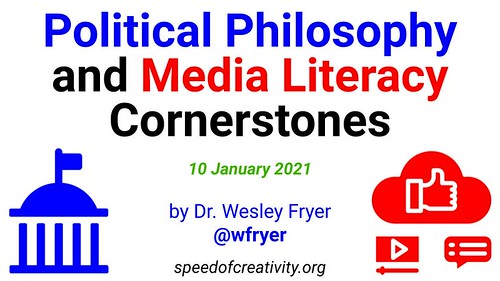
Political Philosophy and Media Literacy Cornerstones
Author: Wesley Fryer
Go to Source
Propaganda and disinformation can have real, destructive effects in society and government. That is one of many lessons we can draw from the past week in Washington D.C., when we saw large numbers of protesters storm the United States Capitol building on January 6, 2021, in a riot which resulted in deaths, injuries, as well as the desecration of offices and hallways in one our nation’s most important and symbolic buildings. As we continue to live through this tumultuous era of history, we should consider the CORNERSTONES of political philosophy as well as media literacy we have as educators in the United States. As citizens and teachers, we each have important responsibilities as well as rights to consider inside and outside our classrooms. As we talk with students and lead lessons which focus or touch on the issues raised by the Capitol riot last week, these “cornerstone statements” may be helpful to use as talking points. While there are many things which divide us as a nation and as citizens today, we need and representative democracy requires we share a commitment to values and pedagogy.
While I would like to limit this list to ONLY media literacy cornerstones, recent research shows support for and faith in representative democracy is waning in the United States, and support for authoritarian government models is rising. (Voter Study Group, June 2020 – Harvard Magazine, April 2020 – Politico, Sept 2020) We need to revitalize civics education in the United States. Media literacy lessons and skills should play an important part in this revitalization process.
Political Philosophy
Commitment and Recognition of Truth: Truth both exists (the nihilistic worldview is invalid) and is essential for society and its government to function.
Aspirational Government: Representative democracy is highly preferable to authoritarian rule.
Value of The Fourth Estate: Everyone has biases, but high quality journalism and reporting DOES and CAN exist and is vital for the functioning of an open and democratic system.
Universal Rights: Human rights are universally endowed by our Creator, and are held by all people regardless of nationality, ethnicity, sexual orientation, geographic circumstance, or faith / religious perspective.
Government Regulation: Government should limit and restrict individual and group behavior to provide for our common defense, protect our rights and curtail our human tendency to sin (therefore all government regulations and restrictions are NOT evil and inherently bad.)
Ethic of Care: Through our shared institutions, collective and individual actions, we should provide for the care and nurturing of our fellow human beings. This includes health care, education, and other basic, human needs.
Media Literacy
Political Struggle and Violence: The use of violence to achieve political ends (war) is a last resort to utilize for moral, coherent and rational ends.
Information Pollution: Propaganda and disinformation can have powerful effects on beliefs and behavior.
Avoiding Fruit Loop Cults: Conspiracies exist, but we should avoid marinating in and being drawn into cult-like, “fruit loop” conspiracy theories.
Filter the Exoflood: As citizens, we each need to develop our capacities to filter information effectively by identifying its sources, credibility and the educative potential.
Be Selective in Choosing Who You Listen To: We should each work to “hack our own minds” in ways which allow us to live and develop into moral, kind, optimistic, idealistic, well educated, constructive contributors to our families, communities, nations and world.
What have I left out or missed? Please share a comment below, comment on this Facebook post, or reply to this tweet to join the conversation.
If you enjoyed this post and found it useful, consider subscribing to Wes’ free, weekly newsletter. Generally Wes shares a new edition on Monday mornings, and it includes a TIP, a TOOL, a TEXT (article to read) and a TUTORIAL video. You can also check out past editions of Wes’ newsletter online free!
Did you know Wes has published several eBooks and “eBook singles?” 1 of them is available free! Check them out! Also visit Wes’ subscription-based tutorial VIDEO library supporting technology integrating teachers worldwide!
MORE WAYS TO LEARN WITH WES: Do you use a smartphone or tablet? Subscribe to Wes’ free magazine “iReading” on Flipboard! Follow Dr. Wesley Fryer on Twitter (@wfryer), Facebook and Google+. Also “like” Wes’ Facebook page for “Speed of Creativity Learning“. Don’t miss Wesley’s latest technology integration project, “Show With Media: What Do You Want to CREATE Today?“

